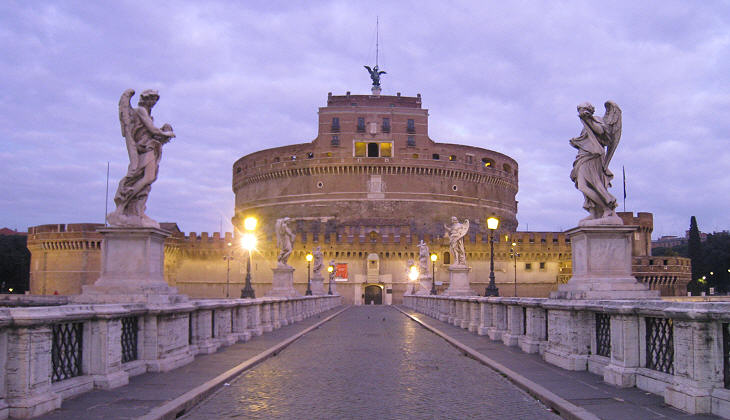
Italian 352 – Rome / Winter 2021
T/Th 12:30 to 2:20
Prof: Albert Sbragia
https://washington.zoom.us/j/93902405175
Trevor Jones office hours (Fridays: 11:00-12:00 -- https://washington.zoom.us/j/91620199072
This course provides an overview of the cultural and artistic history of Rome from its origins to the present. It has been designed for students interested in gaining a comprehensive knowledge of Rome and its unique status in Italian cultural history and beyond, and for students considering study at the UW Center in Rome in Italian Studies or in other programs offered by various UW departments. Literary and historical documents, visual arts and architecture will be used to explore the changing face of the Eternal City, its myths and imagery, from the legendary founding by Romulus, through the Classical and Renaissance periods, to Mussolini’s fascist Rome and the modern Italian city. Rome is one of the world’s most important historical, intellectual and cultural centers and the study of Rome offers a unique point of entry into the diverse cultural traditions which have invested the city and the Italian peninsula with their varied meanings.
By the end of the course, students will demonstrate the ability to:
*discuss the historical evolution and cultural impact of the city of Rome across the millennia
*explore the intersection of art and film with urban studies and politics
*engage in close readings, analysis and discussion of historical and literary texts
*write concise, expository essays with regard to central themes in the course
*prepare for and navigate timed examinations on comprehensive subject material
*travel to Rome and experience the city in an informed and engaged manner
Assignments, evaluation and grading:
Preparation and in-class participation and discussion 15%
Essay paper 1 (2-3 pages)—due January 19 15/20%
Midterm examination—February 2 25%
Essay paper 2 (2-3 pages)—February 23 15/20%
Final examination—March 18 25%
This course will be taught synchronously on UW Zoom during established class hours. Students should go to the Assignments page to see what needs to be prepared in advance of each lesson. Lessons will focus on the presentation and class discussion of history, art and architecture, and primary readings. Students are expected to complete all assigned readings prior to the classroom lesson. Primary readings (Reader 2) will be accompanied by a list of things to look for. Students are expected to write notes and identify key passages in the primary readings to prepare for discussion in class. Students will also engage in small group work and class presentations. Everyone is expected to attend class regularly (preparation and participation grade is based on class attendance) and to observe the same standards of etiquette as if they were in a live classroom (see ‘Netiquette Standards’ below)
All readings for the course will be available through the course Canvas site as uploaded document links in Assignments. Readings are divided into two “Readers.” Reader 1 contains secondary readings and Reader 2 contains primary texts. Exams will be in Canvas format and essays will be written in Word and uploaded onto Canvas. PowerPoint images and other materials used by the instructor will be available to students in the Canvas Files for the course.
The instructor will conduct office hours immediately after every class and will also be available to meet with individual students by appointment. Trevor Jones (trevor00@uw.edu) will be serving as course assistant and will also be available to meet with individual students or student groups for further assistance. Recordings of Zoom meetings will also be made available for review.
The class schedule is as follows:
|
Date |
Homework Assignments |
Class Lesson |
|
Week 1 T 1/5 |
Review course canvas page and syllabus |
Introduction to Course. Early Rome: Topography, Etruscans, Earliest Rome
|
|
Th 1/7 |
Reader 1: Western Civilization (WC): 153-166 Reader 2:Livy, Early History of Rome, pt. 1
|
Discussion of Livy From the Founding Legends to Monarchy to Roman Republic |
|
Week 2 T 1/12 |
Reader 2:Livy, Early History of Rome, pt. 2 Reader 1: WC 166-188
|
Discussion of Livy Later Roman Republic |
|
Th 1/14 |
Reader 1: WC 193-201 Reader 2: Augustus—Res Gestae / Virgil—Aeneid |
End of Republic—Augustus and Empire Discussion of Augustus and Virgil
|
|
Week 3 T 1/19 |
First Paper Due Reader 1: WC 201-213; Khan Academy, Roman Architecture
|
Early-Mid Roman Empire and the Roman Architectural Revolution |
|
Th 1/21 |
Reader 2: Tacitus—Annals (Nero) Reader 1: WC 213-221
|
Discussion of Tacitus Roman Religions and Early Christianity
|
|
Week 4 T 1/26 |
Reader 1: WC 227-243 Reader 2: Constantine and Licinius, Edict of Milan
|
Later Empire / Constantine and Christianity |
|
Th 1/28 |
Reader 1: WC 243-255 Reader 2: Augustine, City of God |
Discussion of Augustine Fall of Roman Empire
|
|
Week 5 T 2/2 |
Review for Midterm |
Midterm Exam |
|
Th 2/4 |
Midterm Consultations |
Midterm Consultations
|
|
Week 6 T 2/9 |
Reader 1: WC, 353-360, 386-388, 399-402 Reader 2: Dante, Inferno Cantos 1 and 34 / Paradiso, Canto VI
|
Rome from Middle Ages to Return of the Papacy Discussion of Dante Alighieri
|
|
Th 2/11 |
Reader 1: WC, 437-444 / Stinger, The Renaissance in Rome, 1-13 Reader 2: Petrarch, Letter to Posterity
|
Papal Rome: The Rise of Humanism and Early Renaissance Art |
|
Week 7 T 2/16 |
Reader 1: WC, 448-450 / Gardner’s Art Through the Ages (excerpts) Reader 2: Machiavelli, Discourses on Livy
|
Discussion of Machiavelli The High Renaissance in Papal Rome: Bramante and Raphael |
|
Th 2/18 |
Reader 1: Gardner’s Art Through the Ages (excepts on Michelangelo) Reader 2: Vasari, Lives of the Artists
|
The High Renaissance in Rome 2, Michelangelo |
|
Week 8 T 2/23 |
Reader 1: WC 534-540 / Gardener’s Art Through the Ages (excerpts) Reader II: Council of Trent, On the Invocation, Veneration and Relics of Saints, and on Sacred Images Second Paper Due
|
Counter Reformation and Baroque Rome: Caravaggio and Bernini |
|
Th 2/25 |
Reader 1: Honour. Neoclassicism (excerpts) Reader 2: Goethe, Italian Journey |
Rome: the Grand Tour, Neoclassicism, and the French Revolution. Discussion of Goethe
|
|
Week 9 T 3/2 |
Reader 1: Merriman, A History of Modern Europe 661-672 Reader 2: D’Annunzio, Child of Pleasure
|
The Italian Risorgimento and Rome as the Capital of the Italian State |
|
Th 3/4 |
Reader 1: Merriman, A History of Modern Europe (1017-1023, 1041-1044, 1062-1065, 1105-1106) Reader 2: Mussolini, Doctrine of Fascism / speeches on Rome
|
Benito Mussolini and Fascist Rome |
|
Week 10 T 3/9 |
Film: La Dolce Vita (Federico Fellini) Reader 1: Hibbert, Rome: Biography of a City, 305-309 / Restivo, The Cinema of Economic Miracles, 3-6 and 39-42
|
Rome and Modernity and Cinema |
|
Th 3/11 |
Film: Sacro Gra (Gianfranco Rosi) Reader 1: Thomassen and Vereni, Diversely Global Rome, 21-34 |
Contemporary Rome: A postmodern global city? |
Final Exam: Thursday, March 18
UW FRENCH AND ITALIAN GRADING SCALE
|
Percentage |
Point |
Letter |
|
100-96.5 96.4-94.5 94.4-92.5 |
4.0 3.9 3.8 |
A |
|
92.4-91.5 91.4-90.5 90.4-89.5 |
3.7 3.6 3.5 |
A- |
|
89.4-88.5 88.4-87.5 87.4-86.5 |
3.4 3.3 3.2 |
B+ |
|
86.4-85.5 85.4-84.5 84.4-83.5 |
3.1 3.0 2.9 |
B |
|
83.4-82.5 82.4-81.5 81.4-80.5 80.4-79.5 |
2.8 2.7 2.6 2.5 |
B- |
|
79.4-78.5 78.4-77.5 77.4-76.5 |
2.4 2.3 2.2 |
C+ |
|
76.4-75.5 75.4-74.5 74.4-73.5 |
2.1 2.0 1.9 |
C |
|
73.4-72.5 72.4-71.5 71.4-70.5 70.4-69.5 |
1.8 1.7 1.6 1.5 |
C- |
|
69.4-68.5 68.4-67.5 67.4-66.5 |
1.4 1.3 1.2 |
D+ |
|
66.4-65.5 65.4-64.5 64.4-63.5 |
1.1 1.0 0.9 |
D |
|
63.4-62.5 62.4-59.5 |
0.8 0.7 |
D- |
|
59.4-0.0 |
0.0 |
E |
ACADEMIC STANDARDS:
Students are expected to maintain a high standard of academic ethics, honesty and integrity. Academic misconduct includes but is not limited to: plagiarism, cheating (which includes inappropriate use of internet--your papers and exams should be based on what we have done in class not what you find on the internet--internet-based answers will result in a zero grade), harassment, and disruptive or offensive behavior, and will not be tolerated. Any student or situation found to be in violation of proper academic conduct will be addressed according to University policy and procedures. Please refer to the University’s Student Conduct Code.
“NETIQUETTE” STANDARDS:
Even though this course is conducted online, please remember you are still interacting with people, not a computer. As such, it is important to adhere to the same standards of behavior that you would follow in a real classroom environment. You and your instructor will work together to establish further class norms for teaching and learning remotely, but here are some preliminary guidelines for engaging in proper “netiquette”:
- Log in to your class meeting a few minutes early and make sure your video and microphone are working properly;
- Sit at a desk or table in a quiet, undisturbed place. Work on a computer (ideally) and avoid moving your device;
- Turn on your computer camera, check the lighting, and make sure the background you are projecting to your instructor and classmates is work-appropriate;
- Be dressed as if you were attending class in person;
- Do not engage in distracting or disruptive behavior (listening to music, eating, answering the phone, carrying on a side conversation, coming and going, etc.)
- Be both participatory and considerate in asking questions and in group and class discussions;
- Look and maintain eye contact with the camera when speaking;
- Mute your microphone when not speaking;
- Refrain from using slang and emoticons when using public chat functions.
POLICY REGARDING STUDENT CONCERNS:
Please see your instructor about concerns as soon as possible. If you are not satisfied with the response you receive, you may contact Geoffrey Turnovsky, Chair, in Padelford C-258/C-237 or at gt2@uw.edu.
ACCESS AND ACCOMODATIONS:
Your experience in this class is important to us, and it is the policy and practice of the University of Washington to create inclusive and accessible learning environments consistent with federal and state law. Disability Resources for Students (DRS) offers resources and coordinates reasonable accommodations for students experiencing a wide range of temporary and permanent disabilities and/or health conditions that may impact their ability to perform well in the classroom. These include but are not limited to; mental health, attention-related, learning, vision, hearing, physical, or other health impacts. If you are experiencing any such difficulties, please contact DRS as soon as possible. Once you have established accommodations, please submit them to your instructor at your earliest convenience so we can discuss your needs and success in this course.
RELIGIOUS ACCOMODATION:
It is the policy of the University of Washington to reasonably accommodate student absences or significant hardship due to reasons of faith or conscience, or for organized religious activities in accordance with Washington state law. The UW’s policy, including more information about how to request an accommodation, is available at Faculty Syllabus Guidelines and Resources. Accommodations must be requested within the first two weeks of this course using the Religious Accommodations Request form.
